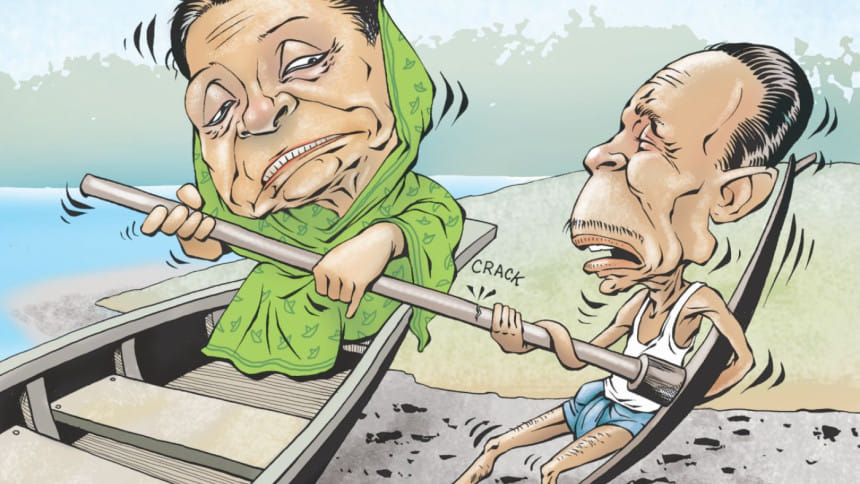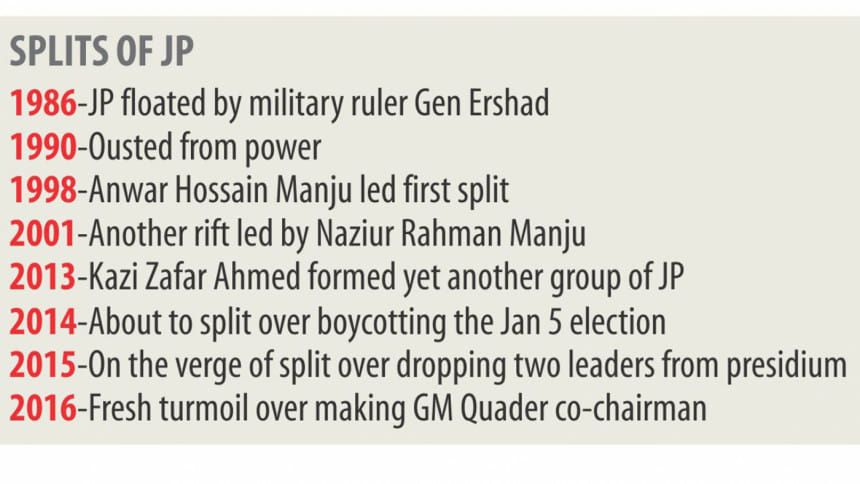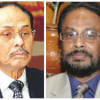Rift in JP widens

Rifts in the Jatiya Party have widened further, as its Chairman HM Ershad yesterday removed party secretary general Ziauddin Ahmed Bablu, who opposed the JP chief's decision to appoint GM Quader as co-chairman.
Addressing a press conference at his Banani office, Ershad accused Bablu of negligence in discharging duties, and replaced Bablu with his loyalist Ruhul Amin Hawlader, who was JP secretary general for 12 years since 2002. Hawlader lost the post to Bablu in mid-2014.
Within two hours of Ershad's announcement, the JP Parliamentary Party comprising 40 MPs held an emergency meeting with Presidium Member Raushan Ershad in the chair. Ershad and Hawlader attended the meeting at the Jatiya Sangsad Bhaban.
JP lawmakers loyal to Raushan opposed Ershad's “unilateral” decision, and asked him to convene meetings of the party's presidium and parliamentary party to discuss the issue.
Ershad and Hawlader walked out of the meeting halfway through.
Emerging from the hour-long meeting, the JP chief told reporters that he would “stick to his decision till his last breath”.
Party insiders told this correspondent that the conflict between Ershad loyalists and Raushan's supporters reached its peak over Bablu's removal.
According to article 39 of the JP constitution, the chairman has the authority to appoint anyone to a party post or remove anyone.
“However, he [chairman] has to discuss the issue with the party's presidium while exercising the powers,” reads the article.
After the JP parliamentary party meeting, State Minister for Labour and JP lawmaker Mujibul Haq Chunnu told The Daily Star that Bablu is the “legitimate” secretary general of the party.

CRISIS IN JP
The party plunged into a crisis after Ershad announced on Sunday that he appointed his younger brother GM Quader as co-chairman.
A number of JP leaders and MPs opposed his decision, saying the party doesn't have any post of co-chairman, according to insiders.
On Monday night, a group of party leaders, including Bablu and JP Presidium Member Anisul Islam Mahmud, held a meeting with Raushan, also leader of the opposition in parliament, at her Gulshan residence.
A couple of hours after the meeting, Bablu told reporters that the JP presidium and parliamentary party decided to make Raushan the party's acting chairman.
JP insiders said Bablu and Anisul made the move with the government's blessings. They kept Ershad's wife Raushan at the forefront to put pressure on him to scrap the decision to appoint Quader as co-chairman.
On several occasions, Quader criticised the January 5 national polls of 2014, and argued that JP ministers should quit the cabinet so it could play the role of a real opposition party.
At yesterday's press conference, Ershad said the JP constitution mandates him to appoint or remove anyone from a party post.
“Bablu worked as party's secretary general for about two years. But he couldn't hold any meeting of the party presidium. I had to attend around 40 council meetings at this age because he couldn't do it.”
Ershad said Bablu had opposed his decision to appoint Quader as co-chairman.
On Bablu's announcement of making Raushan party's acting chairman, Ershad said Bablu had no jurisdiction to make such an announcement, and that no meeting of the presidium or parliamentary party was held on Monday.
Bablu and Anisul phoned several party leaders and MPs that night, asking them to come to Raushan's house, said Ershad.
“It was not a presidium meeting and they had no authority to decide on such a matter. I will make the decision as I am still the party chairman.
“I can firmly say that not even 10 party leaders are with Bablu and Anis [Anisul],” he added.
TAJUL'S BRIEFING
After the JP parliamentary party meeting, Presidium Member and Opposition Chief Whip Tajul Islam told reporters that Raushan was unwilling to talk to the media and asked him to brief reporters.
“The meeting asked the party chairman to elaborately discuss the matter at meetings of party presidium and parliamentary party,” Tajul said.
Asked about Ershad's response to it, he said, “The party chief told the meeting that he will inform us after discussing the matter with Raushan Ershad.”
Anisul, who was with Tajul, claimed the meeting rejected Ershad's decisions.
Earlier at the meeting, Raushan criticised Ershad for his “unilateral” decisions to appoint Quader as co-chairman and remove Bablu from secretary general's post, according to meeting sources.
Raushan said all party men will accept Ershad's decisions but he needs to discuss those in party forums.
Two of the lawmakers criticised Ershad for making decisions unilaterally.
Ershad told the meeting that he had appointed Bablu to secretary general's post “under pressure” from the government, and Bablu “failed to discharge his duties,” according to the sources.
Bablu couldn't organise the JP at the grassroots level and the party suffered a humiliating defeat in the recent local body elections, he said.
Criticising the government for its “interference” in JP affairs, he said though the government gave him the honour of serving as PM's special envoy, it “humiliated him” in different ways, said the sources.
The JP is in an identity crisis and cannot play the role of a real opposition party for having three of its leaders in the cabinet, he said.
Raushan then urged Ershad to convene a meeting to discuss these issues.
Referring to the present crisis in the JP, Awami League Joint Secretary General Mahbubul Alam Hanif said, “Whatever is happening in the Jatiya Party is their internal affair.”
The AL doesn't believe in splitting political parties, Hanif told reporters after a meeting of the AL nomination board on local government election at the Gono Bhaban.
The recent developments in the JP have given rise to speculations over another break-up in the party that has split thrice since 1998. The party also faced severe internal conflicts on several occasions.
The seed of the present crisis was sown during the January 5 election.
A few weeks before the polls, Ershad announced that his party wouldn't contest the election, which was already boycotted by the BNP-led alliance. He directed his party nominees to withdraw nomination papers.
But defying Ershad's decision, a group of JP leaders, including Anisul and Bablu, decided to participate in the election under Raushan's leadership.
Sheikh Hasina appointed Bablu as one of her advisers in the polls-time government.
After the AL returned to power through the January 5 polls, JP leaders Mujibul, Moshiur Rahman Ranga and Anisul -- all loyal to Raushan -- were inducted into the Hasina-led cabinet.
Raushan became the leader of the opposition in parliament, and Ershad was made special envoy to the PM.
Of late, the party got polarised over Ershad's statement that the three JP ministers should leave the cabinet to restore its “image as a real opposition party”.

JP SPLIT THRICE
Formed in 1986, Ershad-led JP first split in 1999 centring the party's then secretary general Anwar Hossain Manju's decision not to quit Hasina's cabinet as communications minister.
Ershad later formed an electoral alliance with the BNP and launched street agitation against the AL-led government. But he couldn't maintain his relations with the alliance.
Under “pressure” from the then AL-led government, Ershad announced quitting the BNP-led alliance. His announcement resulted in another split in the party before the 2001 parliamentary election. This time Naziur Rahman Manzur led the revolt and formed another faction of the JP.
At the end of the previous tenure of the AL-led government, there were intra JP conflicts following Ershad's decision to join the Hasina-led election time government.
The dissident leaders accused Ershad of going back on his earlier statement that his party wouldn't contest the election if other opposition parties boycotted it.
Ershad expelled party's senior leader Kazi Zafar Ahmed, accusing him of leading the dissidents. Kazi Zafar and a group of dissident leaders formed a new party in November 2013.

 For all latest news, follow The Daily Star's Google News channel.
For all latest news, follow The Daily Star's Google News channel. 








Comments